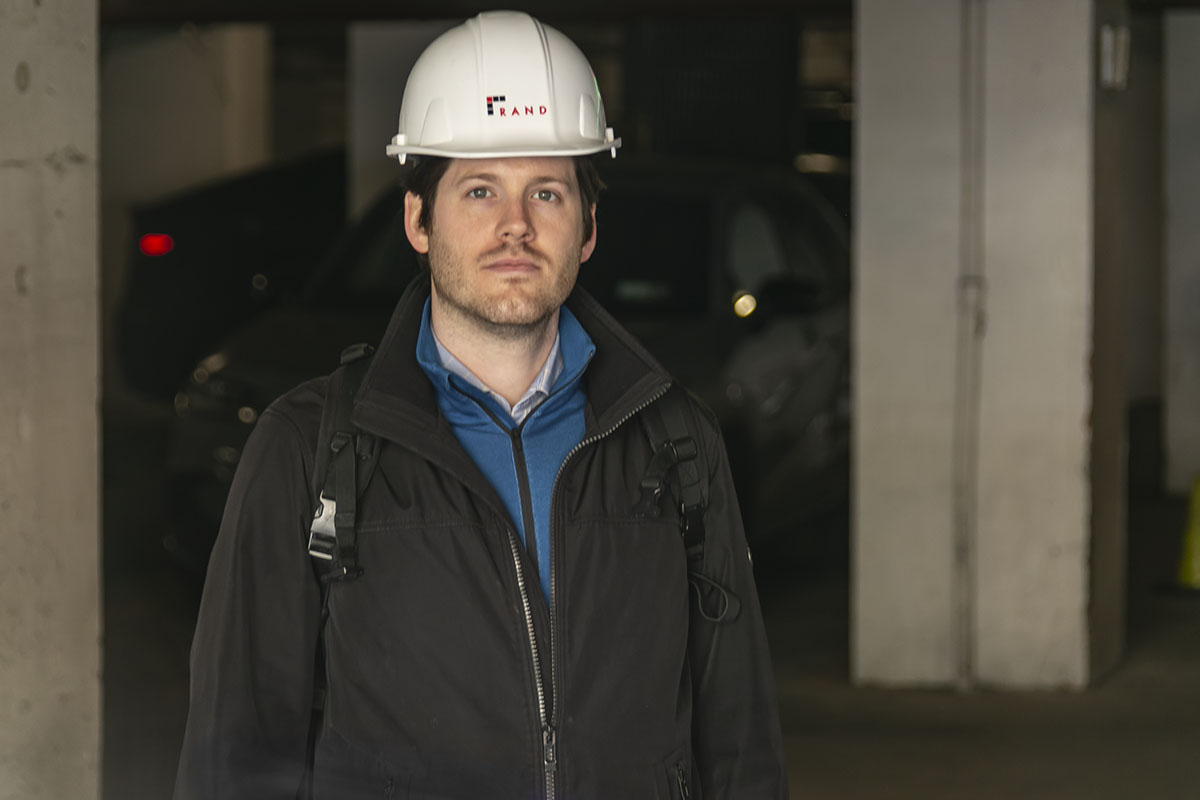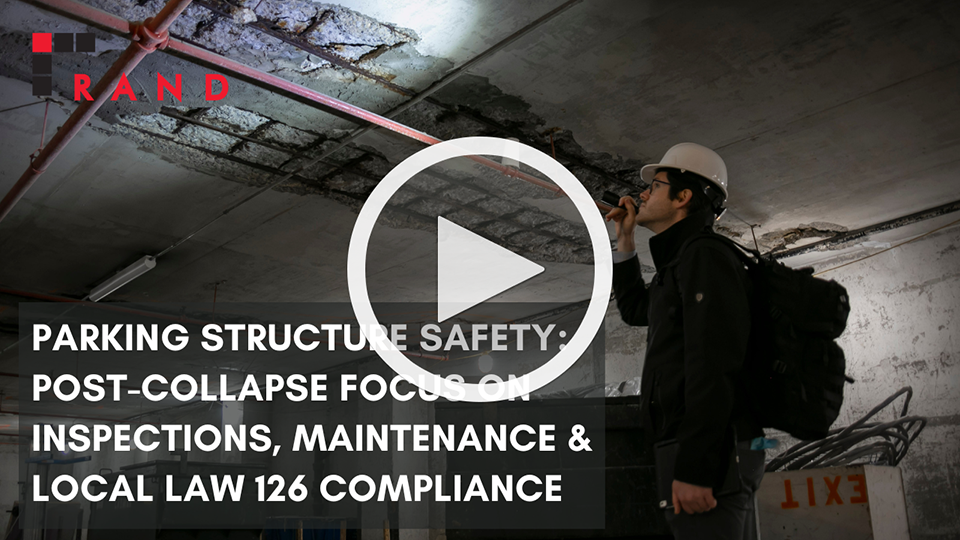Q&A with a QPSI: RAND Senior Structural Engineer Jason Damiano, PE

In this Q&A, we sat down with RAND Senior Structural Engineer and Qualified Parking Structure Inspector Jason Damiano, PE, who shares his expertise on how to maintain parking structures at safety standards and comply with the DOB’s Periodic Inspection of Parking Structures (PIPS) program, per Local Law 126 of 2021, a key piece of legislation that outlines inspection and maintenance requirements for these structures in New York City.
Jason, what exactly is a QPSI?
Good question. QPSI stands for Qualified Parking Structure Inspector. As a QPSI, my role is to assess the safety and structural integrity of parking structures in New York City, in compliance with Local Law 126’s parking structure inspection requirements. Per the law, QPSIs must be a New York State licensed professional engineer with a minimum of three years of relevant experience in parking structures. In addition to my experience, I have undergone a formal certification process with the New York City Department of Buildings (DOB).
NYC enacted a new law called Local Law 126 in 2021 which requires owners of parking structures to routinely have their garages inspected by a QPSI. What are the law’s key requirements?
Of course. Owners familiar with the Facade Inspection and Safety Program (FISP) will notice Local Law 126’s Periodic Inspection of Parking Structures (PIPS) program is very similar. Essentially, owners must hire a QPSI to perform a parking garage inspection in line with the requirements from the New York City Department of Buildings (DOB). Once the inspection is completed, the QPSI will file the report with the DOB identifying the parking structure as either Safe, Safe with Repairs and/or Engineering Monitoring (SREM), or Unsafe. It’s important to note that these inspections are meant to be conducted on a regular basis, so that any issues can be detected and addressed promptly.
What was the impetus behind the legislation?
Unfortunately, it took a serious structural failure to propel legislation. In 2019, the collapse of a parking garage in Binghamton jumpstarted New York State to require inspections. At that time, New York City was exempt from these inspections. This changed January 1, 2022, when New York City implemented its own parking structure regulations which you know as Local Law 126 or PIPS, aiming to prevent similar incidents and save lives. As seen recently in the news, a fatal parking garage collapse at 57 Ann Street tragically led to the death of one person and injuries of five others. That particular garage had several open violations and had been due for its first PIPS inspection at the end of this year.
This is a tragic reminder that parking garages can be particularly vulnerable to structural failures due to various factors. Although garages are designed for the heavy vehicle loads and vibrations they experience on a day-to-day basis, if the structure is allowed to deteriorate over time, the structure can weaken and become susceptible to failure from these everyday loads. Vehicles entering garages bring in water and salt that penetrate into the concrete. This accelerates the deterioration of concrete and steel structures, increasing the risk of structural failure. Open parking garages are more exposed to rainfall and other weather elements. The other side of the coin is true for below grade garages. They are subject to flooding or water pressure from ground water. Many times, utilities run through the garages and contribute to leakage issues.
What is the difference between Local Law 126 of 2021 and PIPS?
Local Law 126 of 2021 actually refers to New York City’s updated legislation, revising various city codes including administrative, plumbing, building, mechanical, and fuel gas regulations. A key element of this law, Article 323, established mandatory periodical parking structure inspections.
PIPS, or the Periodic Inspection of Parking Structures program, was created by the DOB to implement these inspections. The protocol that a QPSI adheres to when inspecting a parking structure is dictated by PIPS. The program delineates the methodology of the inspections and what aspects to focus on. Although commonly known as Local Law 126 inspections, it’s actually a bit of a misnomer to label the mandatory parking structure inspections this way. That’s because Local Law 126 covers a far more extensive range of building codes than just parking structures.
Do all parking garages need to comply with PIPS?
Yes, all NYC garages would need to comply. The only structures that are not included in this law include autobody/automotive repair shops, automotive showrooms, or automotive service stations, garages with occupancy of fewer than three cars, unenclosed and unattached lots, or garages serving one- and two-family homes.
When is the deadline to comply?
The deadlines for complying with PIPS depend on the Community District your parking garage is in. Similar to FISP, there are filing windows within each cycle. Each cycle is 6 years long, meaning you will have to have your parking structure inspected at least once every 6 years. In the case of PIPS, there are three 2-year filing windows within each 6-year cycle. If it’s in Manhattan Community Districts 1 to 7, you’ll need to file by December 31, 2023. If your garage is in Manhattan Community Districts 8 to 12 or any Brooklyn Community District, the deadline is December 31, 2025. And if it’s in any Bronx, Queens, or Staten Island Community District, you have until December 31, 2027, to file. It’s really important to keep track of these deadlines to make sure you’re in compliance with the law.
What does SREM mean?
SREM is short for “Safe with Repairs and/or Engineering Monitoring.” If a QPSI inspects a parking garage under PIPS, and classifies it as SREM, this means that conditions were observed within the garage that require repairs, maintenance or monitoring prior to the next inspection cycle to prevent them from deteriorating into unsafe conditions. The DOB requires the QPSI to submit a stability analysis with the PIPS report to show via structural calculations that the structural framing experiencing the observed SREM conditions still has the capacity to carry the applied loads. Note that any SREM conditions not repaired by the next PIPS inspection cycle will automatically be classified as unsafe.
What happens if unsafe conditions are found in a parking garage?
That’s another good question. If a parking garage is found to have unsafe conditions, the first thing that needs to happen is to notify the DOB and the building owner right away. The areas of the garage affected by the unsafe conditions will need to be closed immediately. The QPSI will then recommend protective measures and repairs, and the owner has 90 days to get those repairs done. If they need a bit more time, they can ask for an extension. But if they don’t take care of the issues, they might face fines, penalties, and even the closure of the garage until the structure is deemed safe again.
What measures do you recommend for building owners and managers to maintain the structural integrity and safety of their parking garages, particularly in the face of aging infrastructure and harsh environmental conditions?
I’d say it’s important for owners to plan and budget for inspections and any necessary repairs. Taking care of issues early on can prevent more costly repairs in the long run, and more importantly, keep people safe. It’s also a good idea for owners to do regular visual checks, address any issues right away, and have a preventive maintenance plan in place. As the primary source of deterioration in garages is water and deicing salts brought in by vehicles, the installation of a protective traffic coating is a necessary part of any repair program. If a major garage repair program is undertaken and a traffic coating is installed, future repair programs may be limited to traffic coating repairs rather than structural repairs, which will significantly reduce costs over time.
How does a QPSI help with PIPS compliance?
At RAND, our process as a QPSI begins with a thorough review of documents submitted to us. Next, we’ll visit the site and conduct a detailed visual survey. During the survey, we’ll inspect all exposed surfaces and carry out a physical examination on at least 10% of each structural element type, which can be satisfied by sounding, but may also include probing, scanning or testing. We’ll also document our visit with notes, photos, and sketches as needed.
After completing the visual survey, we’ll create a Parking Structure Annual Observation Checklist tailored for the specific property. The checklist will help owners identify potential areas of concern to monitor each year between condition assessment cycles. Additionally, RAND will prepare a comprehensive Parking Structure Condition Assessment Report in compliance with DOB requirements, helping your property remain up to code.
Is compliance with PIPS optional?
No, compliance with PIPS is definitely not optional. Just like with FISP, if a building owner misses the deadline or decides not to file, they’ll face some fairly hefty fines and violations.
- If you file late: There’s a fine of $1,000 for each month past the deadline.
- If you don’t file at all: You’re looking at a $5,000 fine per year past the deadline.
- Not correcting unsafe conditions: You’ll get a $1,000 fine per month until the unsafe conditions are fixed, an acceptable Amended Report is filed, or an extension of time to complete repairs is granted.
- Not addressing SREM conditions: There’s a one-time fine of $2,000 if you don’t correct SREM conditions. Unaddressed SREM conditions also become unsafe automatically during the following PIPS cycle inspection.
It’s important for building owners to comply, not just to avoid these financial penalties, but also to maintain the safety of their parking structures.
For more information on Local Law 126’s parking structure inspection requirements and the PIPS program, read our fact sheet or watch our webinar, featuring Jason and RAND Structural Team Leader Jimmy Vignola, PE.
Contact RAND
RAND’s Structural Team and QPSIs can assist garage owners and managers in navigating these critical processes. Our structural engineering services for parking structures include:
- Local Law 126/PIPS inspections conducted by experienced QPSIs
- Compliance assistance to ensure adherence to regulations
- Comprehensive parking garage inspections to identify structural issues
- Customized repair programs tailored to address specific maintenance needs
- Structural assessments and maintenance recommendations
- Emergency inspections for structural failures or urgent situations
- Damage assessment and repair services following emergencies or natural disasters
To schedule a consultation regarding your property, contact us at (212) 675-8844 or info@randpc.com. We look forward to speaking with you.

